Monolithos Winery, Cyprus

For the first time on the "Yellow Road" a Cypriot winery. Winemakers from Italy, France, Spain, Portugal, Lebanon and even Switzerland were on the "YR"". But there was no Cyprus. Of course, one could ask my fellow student from Riga, Aleksey Sh., who lives there, to take the initiative. But everything is difficult now. And not everyone can be trusted with such an important matter as tasting.
Now about the wine. About the amazing Xynisteri grape variety. And, of course, it is very fortunate that the winery "Monolithos" has this wine.
"Monolithos Xynisteri, made 100% from Xynisteri (the prevailing indigenous white grape variety of the Cypriot vineyard), is a medium bodied, crisp, dry wine. It exhibits very pleasing lively aromas and flavours of flowers, green apple, banana and citrus and a long and pleasant aftertaste. Its charming lemon-green color and intense nose make this versatile wine ideal for pairing with food because of its balance of sugar and acidity".
Interview on Yellow Road with the manager of the winery "Monolithos" Charalambos Pericleous. Charalambos Pericleous , Winemaker, Manager
1 - Please tell us a little about your family. How did you become a wine-maker?
The poetic couplet “the vineyards, my alphabet, my first reading of the world” depicts in a few words my relationship with grapes and wine. Born in Pachna, the biggest “krasochori” (wine village) in the Limassol district, I spent the first years of my life in the vineyards close to my grandfather’s cellar watching every step from collecting grapes to wine-making. Of course, at that time, wine was made in “pitharia” (locally produced large clay jars used to ferment and age wine since ancient times). The traditional donkey was the main facility to transport grapes and oxen were used to plough the vineyards as the fields were inaccessible to tractors. Consequently, the history of wine-making in the family goes back to the tradition of growing grapes and making wine in the village of Pachna for more than a century. However, when I was 18, I left Cyprus for England in order to study engineering. Of course, when you are that age, you don’t always have a clear vision of your future. My personal involvement with wine was an inevitable development later in my life when, having inherited a number of vineyards from my parents, I felt I had a duty to continue the tradition and it never crossed my mind to do any other job. Wine-making most likely is in my DNA. Monolithos Winery was established in 1999 in Pachna village. The location of the winery was changed in 2016 and the new, three-story building sits predominantly at the exit of the village towards Ayios Amvrosiosand Omodhos. The winery is fully fitted with state-of-the-art equipment and currently has the capacity to produce 40,000 bottles.
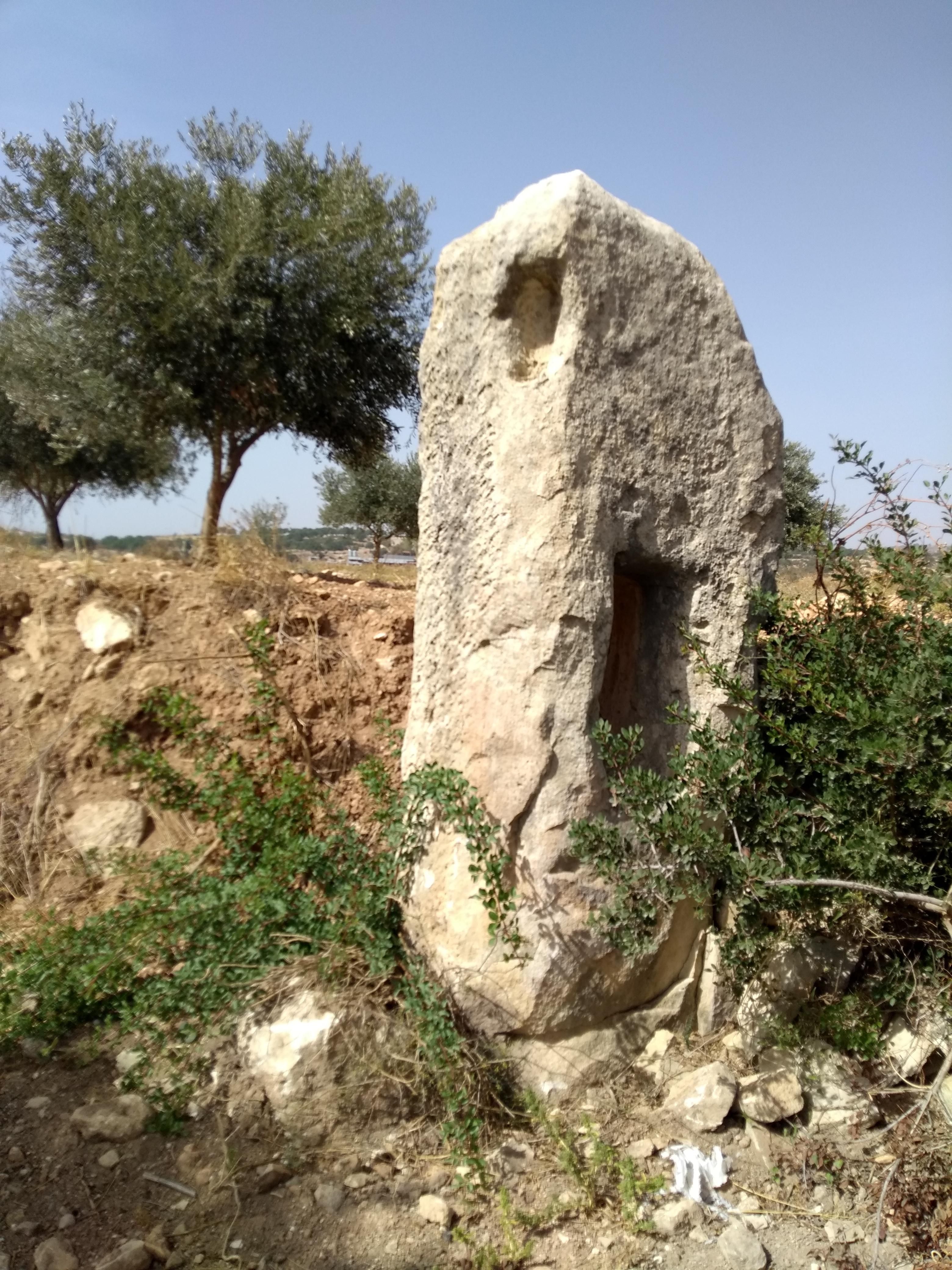
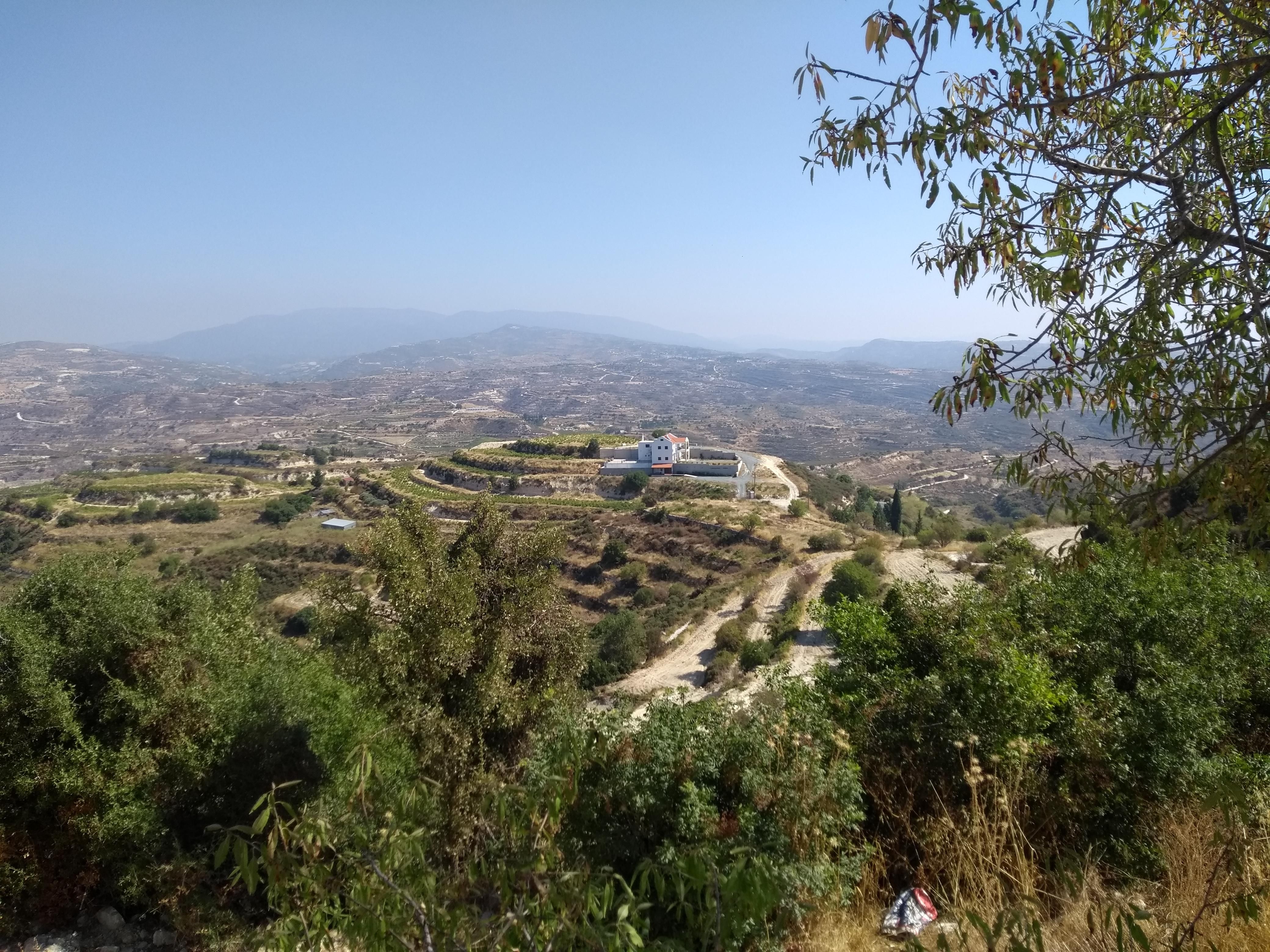
2 - Well, why does the winery have such an unusual name?
Wineries are usually named after their founder and family origins, after geographical names, after some symbol of the area and, of course, religious names (e.g. monks, monasteries), especially if they contributed to its establishment. It is also widely acknowledged that the most difficult thing about buying wine is remembering the name of the producer. Monolithos Winery takes its name from the pierced monolithic stones scattered around the fields. The word “monolith” is derived from the Greek word “monolithos”, a combined word from “MONO” meaning “single”, and “LITHOS” meaning “stone”. A monolith is therefore a single massive stone or rock, or a single piece of rock placed as, or within, a monument. Most of these pierced stones can be found between the village of Pachna in the Limassol district and Kouklia in the Paphos district. Over the centuries, the use and usefulness of these huge stones has been forgotten. However, the local population has come up with a number of different “explanations” and “interpretations”, some of which are elegant and possibly a little mysterious about the existence of these strange structures discovered in isolated locations. Legends, myths and tales of superstition revolve around monoliths and are actually part of the Cypriot culture since antiquity. These ancient remains are often associated with hidden treasures which make them even more attractive. The “Mystery of the Carved Monoliths” has attracted the attention of researchers and grave robbers since the 19th century. First among them was the notorious Luigi Palma di Cesnola, the man who, from 1866 to 1877, literally looted the archaeological sites of Cyprus. In 1874, Cesnola came across the two huge perforated monoliths located a few kilometres south-west of the temple of Aphrodite in Palaipaphos (Kouklia). He was well aware of the rumours regarding mythical “treasures”, one of which was reports that at a certain time of day, sunlight would pass through the holes of these monoliths and illuminate a point on the ground where the treasures were hidden. Consequently, it’s not surprising that Cesnola excavated the area, however he failed the find anything valuable and abandoned further digging. Even today, there are local people who consider these monoliths as a deterrent for fever and other diseases. Patients who come to these monoliths hang parts of their clothing on the stones, believing that in this way, they would be rid of the disease. Monoliths were also considered as having therapeutic powers by the Cypriot women who could not have children. There were also cases where people assumed that the monoliths were instruments of “trial”, and that a person who was able to pass his/her body through the hole of the standing stone would win a prize of some description. The mystery of the monoliths was solved about 50 years ago when the Cyprus Department of Antiquities excavated a site not far from Kouklia, close to the sea. This excavation revealed that these monoliths were related to the worship of the Goddess Aphrodite, and were simply part of an ancient olive or grape presser. We named our winery “Monolithos” with a notion that embraces commitment and devotion to Cyprus heritage combined with a memorable name, a name that means something to us.
Monolithos has a story intended to bring to mind the local myths surrounding these magical stones, standing with their strange stature in various parts of the island of Cyprus, and particularly near the region of Pachna where our winery is located. There is a story to tell, just like wine-making has a long and fascinating history.
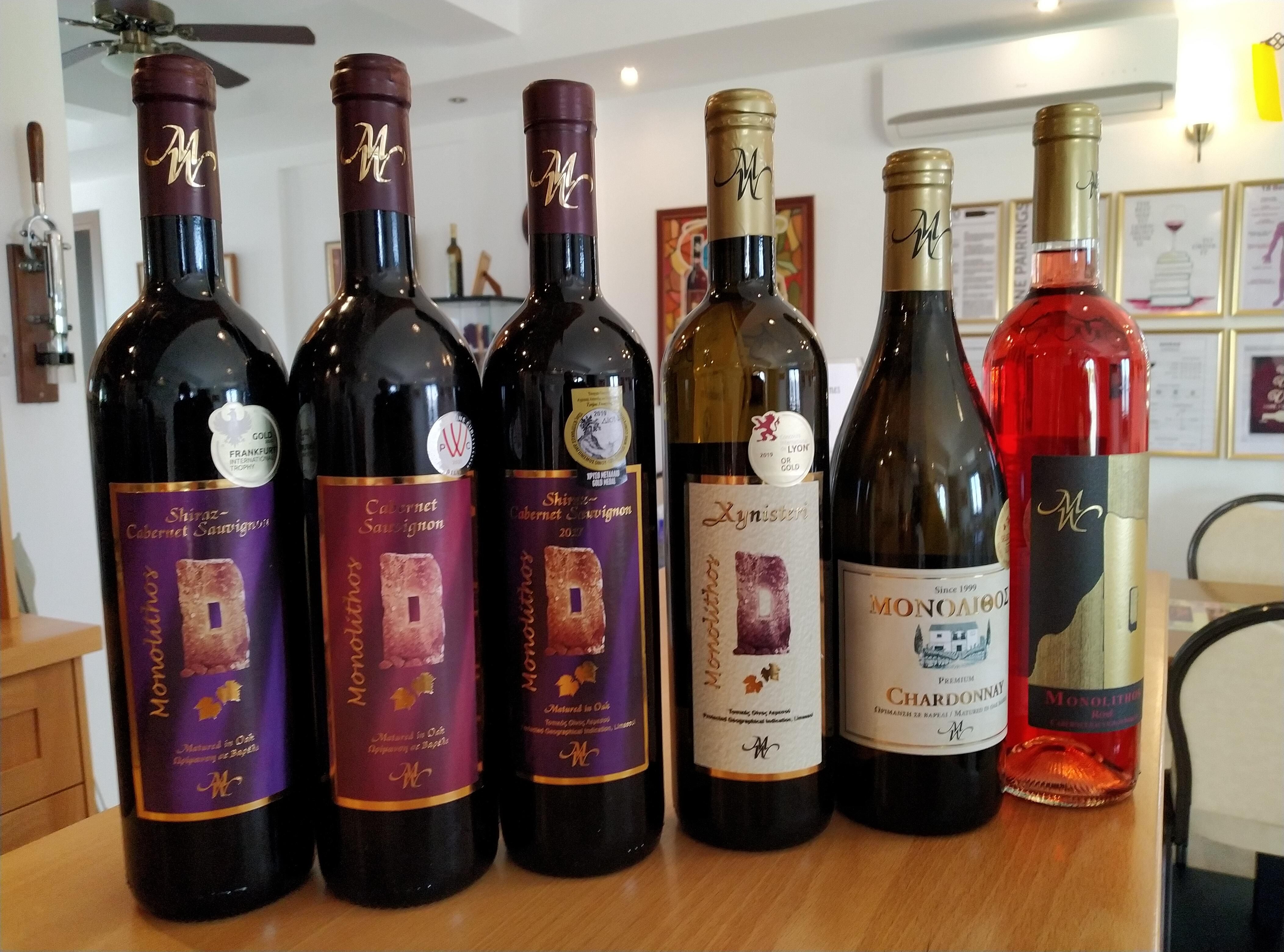
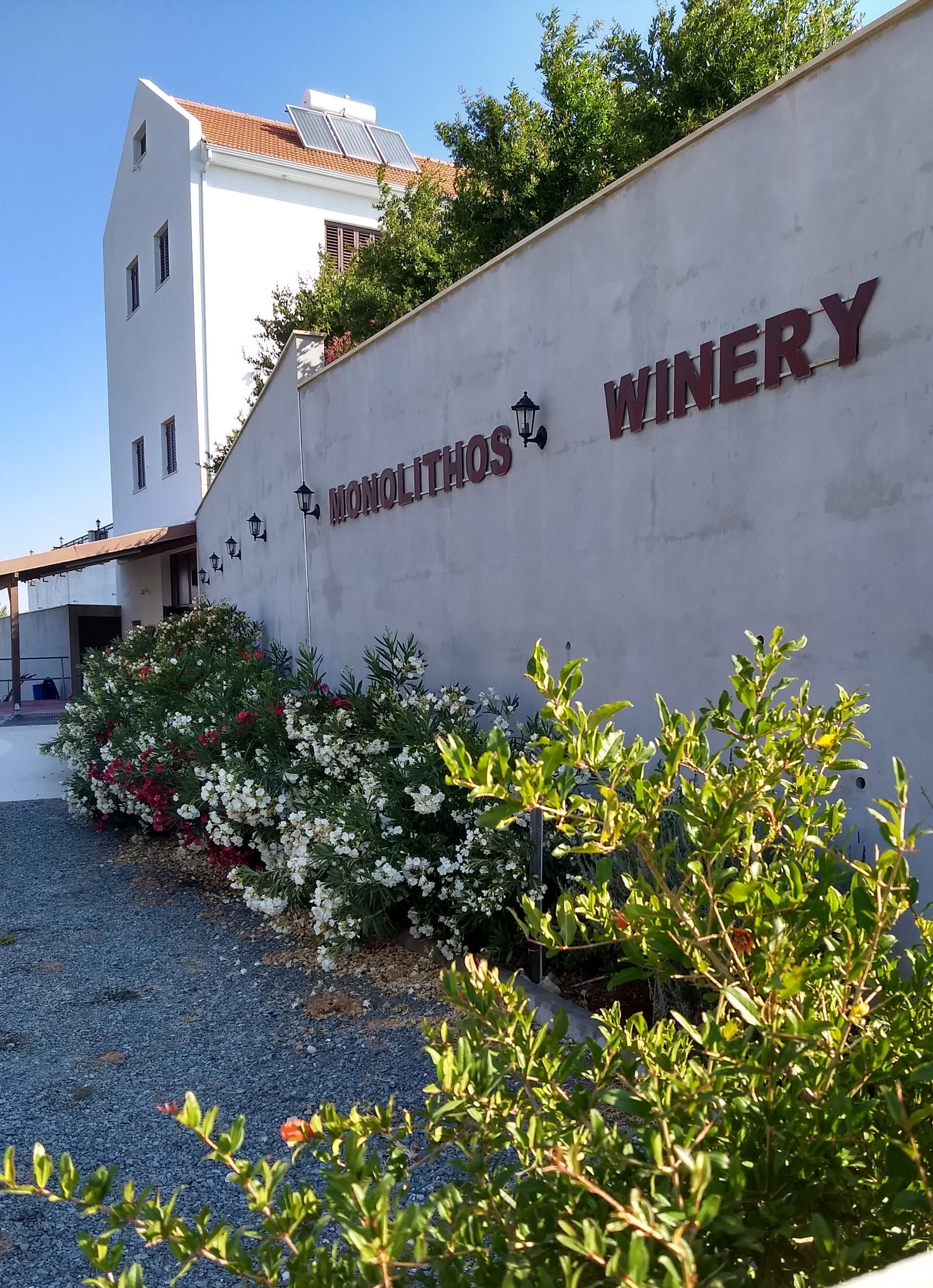
3 - Yes, Cyprus is the oldest wine producing country. Its wine history goes back over 5000 years. Can you elaborate on whether old wines were very different from modern wines?
One of the oldest wine-making regions in the world is Cyprus . A study of the evolution of wine in Cyprus reveals three broad and distinct periods, or three leaps in history that have left their marked footprints in the development of the island. The first period lasted several thousand years, from the time the cultivation of the vine appeared on the scene till the time the Ottomans discouraged wine-making and its consumption. The second period begins with the arrival of the British, which triggered the revival of the wine industry and lasted nearly a century. The third is the period we are currently experiencing, a period of rapid growth– a wine revolution that aims at providing the international market with world-class wines with Cypriot identity. Wine in antiquity was made from the fermented juice of grapes, but what was drunk was not wine as we know it. For a start, it wasn’t clear and bright, like most modern wines, but heavy in sediment and suspended matter: grape skins, twigs, seeds, and other vegetal material caught in the bunches of grapes when they were crushed or attracted to the must. Furthermore, preservation methods are also an important noticeable culinary difference between ancient and modern wine. Modern bottles help protect wine today, but exposure to oxygen quickly spoiled ancient wines. Vintners tried to preserve them with resin, which made the wines sticky and thick. Other additives included lead, lye-ash, salt, pepper, and random assortments of herbs that were used to make wine remotely palatable. The ancients didn’t fully understand the process of fermentation – where yeast converts sugars into alcohol – and considered wine and its intoxicating effect a gift from the divine. Often the pots were left open during fermentation before being sealed with clay or resin since they were not aware that air must be kept out of the vessel to prevent oxidation. At symposia, the drinking gatherings, wine was diluted until it was between 25% to 40% of the beverages. Wine was drunk as a cocktail. The wine-making techniques practiced in Cyprus during antiquity was drying grapes so as to concentrate their flavour and sugars. The final result of this process was a rich, sweet and sometimes viscous dessert wine that was high in alcohol and intense in flavour. Hesiod describe the manufacturing process of the sweet "Nama" of Cyprus. "Leave the grapes ten days in the sun, ten nights and then five days in the shade and eight more in the jar". After pressing the partially dehydrated grapes, the must was transported into large containers so that the fermentation continued with high levels of alcohol. Once the period of primary fermentation was over, the “pithari” (or amphora) which was buried in the ground to ensure climate control, was covered with a large stone to create an airtight seal. The wine produced with this quite simple but ancient method that is noble and romantic, and whose life is long-standing as of no other wine in the world, would be named centuries later by the Crusaders as “Commandaria”.
4 - Does the variety Xynisteri only grow in Cyprus? What international cultivar is similar to it?
Xynisteri is a white grape used predominantly for dry white wines or in the famous dessert wine, Commandaria. Xynisteri vines are planted almost everywhere on the island. The dry, limestone-dominant Cypriot terroir has given the variety a suitable home. The name “Xynisteri” in Greek implies something “acidic”. The vineyards of Cyprus are among the very few in the world that were unaffected by the vine louse, known as phylloxera, a disease that fell upon the greatest part of Europe’s vineyards at the beginning of the 20th century, destroying them almost completely.
The variety is native to Cyprus and for many years, it was considered too simple and elegant to be used in anything other than table wine. However, as wine-making has improved and technology in the winery has progressed leaps and bounds, Xynisteri today is used in a whole range of premium, high-quality wines made for both domestic and export markets. When used well, wines can range from dry styles similar to Chablis through to softer, more tropical Sauvignon-style wines.
Sometimes, the ageing of Xynisteri wines is done in oak which brings nuttier and spicier tones to the forefront and are occasionally blended with some other white wines such as Sauvignon Blanc or Riesling.
It is perhaps worth mentioning that in 2019, Xynisteri vines were exported from Cyprus to Australia under a trial programme to test their irrigation needs. The decision to import and plant Cypriot vine species in Australia comes from the necessity for the wine industry to survive and be more sustainable as water supplies lessen and temperatures continue to rise. According to research papers, the Cypriot indigenous variety of Xynisteri has excellent drought-coping mechanisms and performs far better than Sauvignon Blanc. Xynisteri vines are reportedly to be more resilient to hotter, drier temperatures and are suited to less-to-no irrigation during the warmer months.
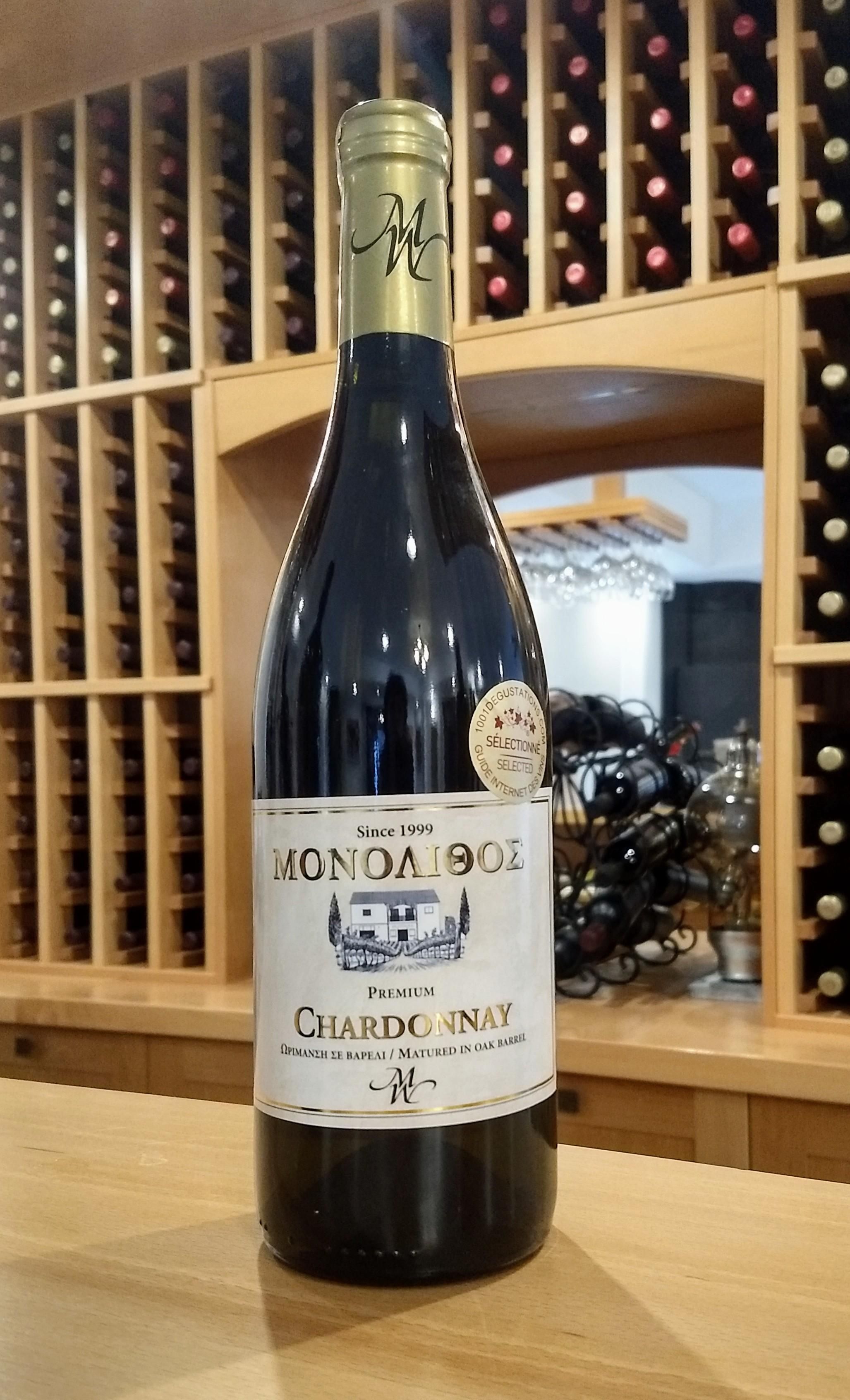
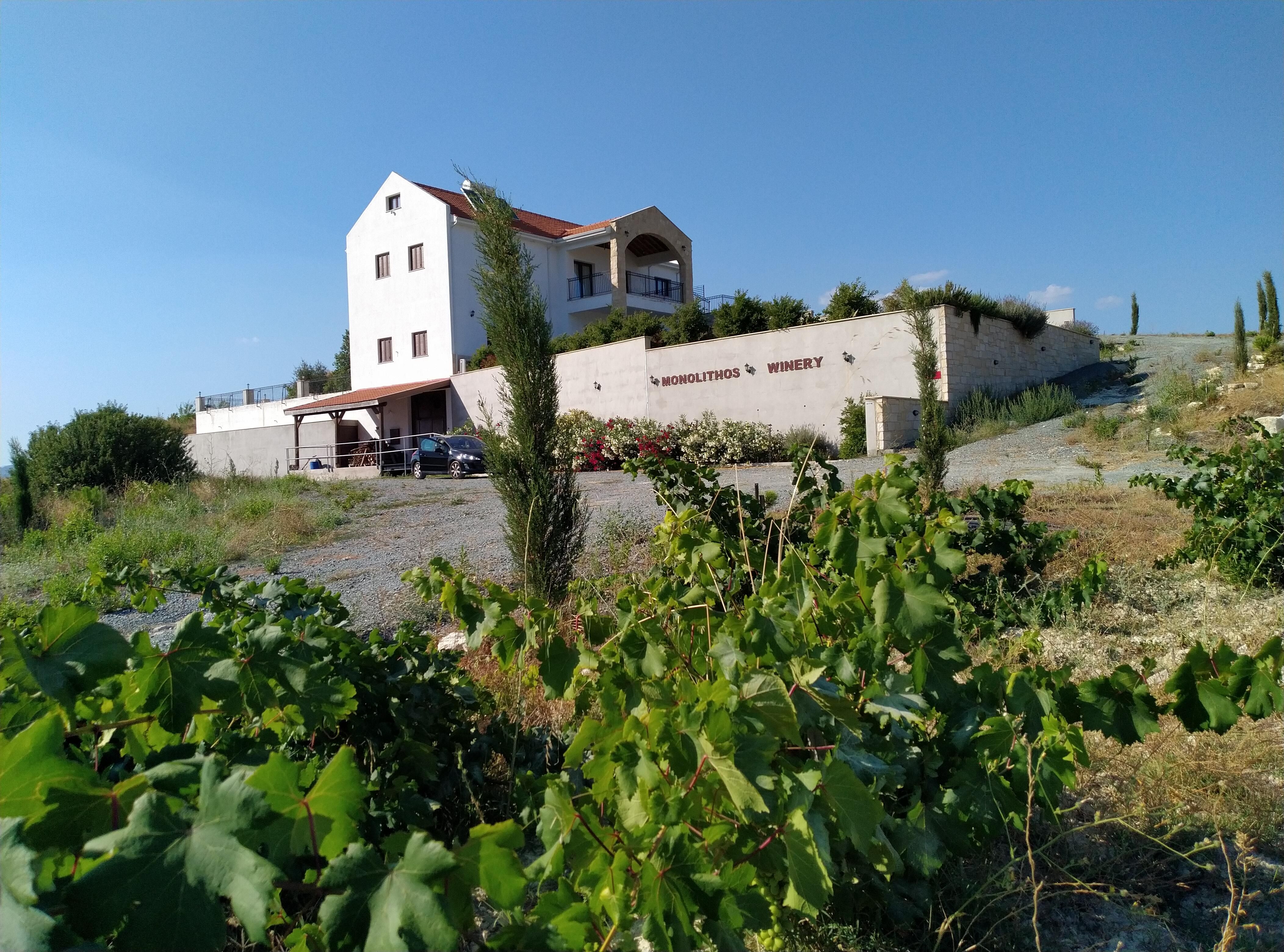
5 - Your white Monolithos Premium Chardonnay. Is this an Uncommon ABV (Alc. 14.5%) for a white wine?
You are obviously referring to our 2017 vintage Chardonnay. Let me briefly explain what was “uncommon”. That specific year we experienced rather unusual weather. We were planning to produce a wine with 13.5% alcohol. Each year we sample and test regularly the progress of the ripeness of the grapes and as we approach the expected sugar level target, we plan the day of harvesting. The average temperature in July is around 35°C and harvesting Chardonnay is scheduled for the middle of August. However, on 1st August 2017, the temperature soared to 45°C. Consequently, although we brought forward the date of harvest, the sugar level was much higher than expected. Consequently, the 2017 Chardonnay vintage resulted in a more robust and high alcohol wine.
Monolithos Chardonnay is matured in oak barrels for three months. We use the French method known as “Batonage sur Lie”. Batonnage is a wonderful tool for quality Chardonnay winemakers. It involves stirring of the lees – yeast cells that fall to the bottom of the oak barrel. The stirring takes place usually once a week. Employing batonnage in winemaking helps to balance the wine and can add extra body and mouthfeel to the wine.
Monolithos Chardonnay is a lively blend of grapes from three vineyards. Fruity with flavours of pineapple, guava and mango, this wine pairs well with a variety of dishes such as light appetizers, seafood or grilled vegetables, as well as chicken and turkey breast, pork loin and soft- and semi-soft cheeses, best served at a temperature of 10º-12ºC.
6 - How to get from Limassol to your vineyards?
Monolithos Winery is located 500 metres northeast of Pachna (Greek: Πάχνα) and lies at an altitude of 750 meters above sea level. The village of Pachna is about 35kilometres north-west of the city of Limassol, and a similar distance north-east of Paphos. Whether you travel from Limassol to Paphos or vice versa, there are two main routes you can choose to reach the Winery. One is to exit the main highway at the village of Avdimou (exit 38 off the highway), which leads you onto the F606.
As you travel up, passing through Prastio village on the way, you will see slopes covered with carob trees which shade the grazing flocks, so very characteristic of the eastern Mediterranean. Another route is to exit the highway onto the E601 at Erimi. This takes you through the villages of Kantou, Souni, Kivides and Agios Amvrosios to the entrance of Pachna where the Winery is located. If you are travelling down from the Troodos Mountain range, take the road leading towards Platres, after which you will pass through Omodhos, Vasa and Malia villages before reaching Pachna. The Winery is situated at the eastern entrance to Pachna Village and is well-marked. There is an access road leading to the winery which is convenient for visitors.
Ayiasmata Pachna, 4700 Pachna, Cyprus Coordinates: 34.7843424292, 32.7958416939
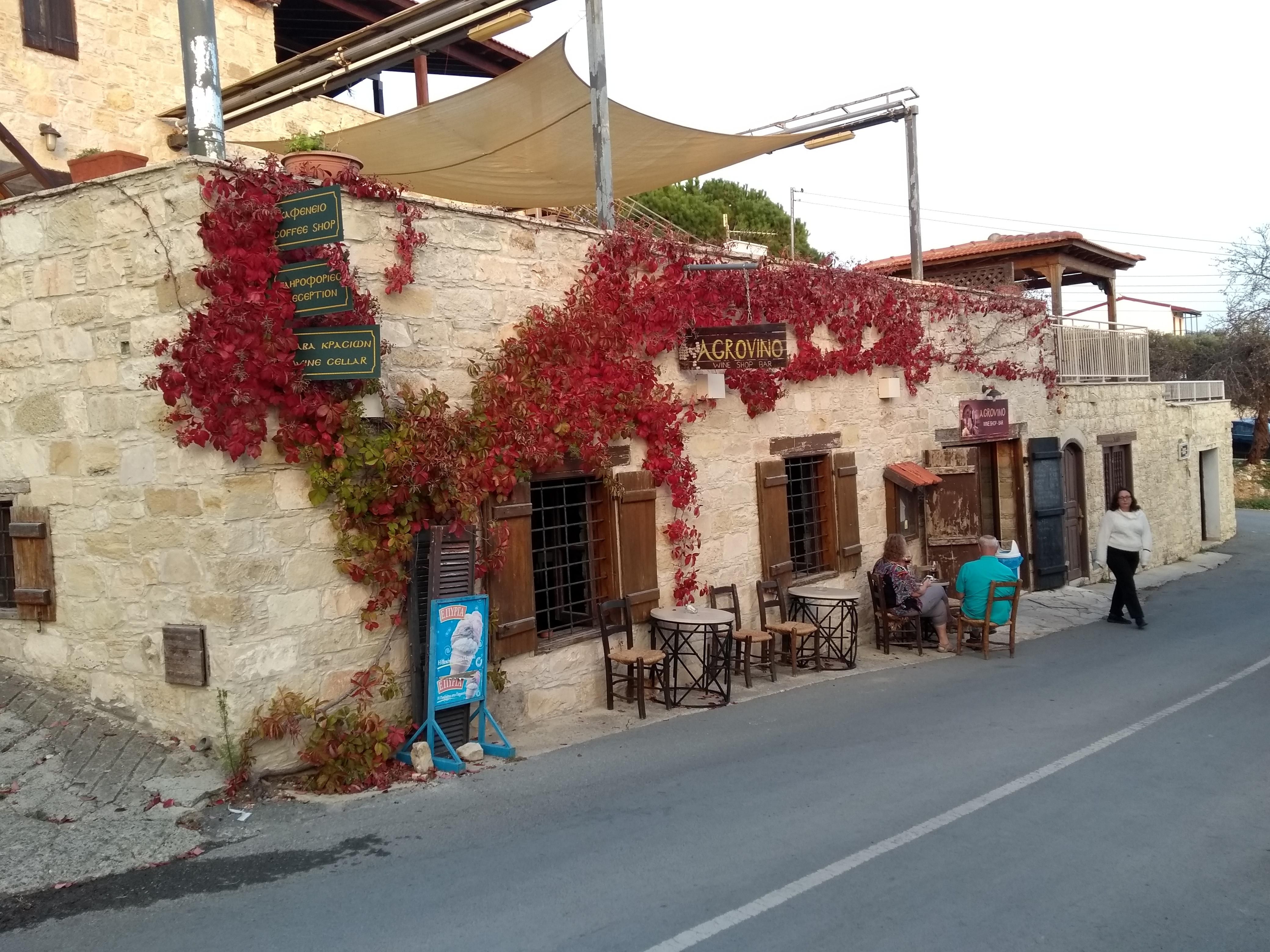
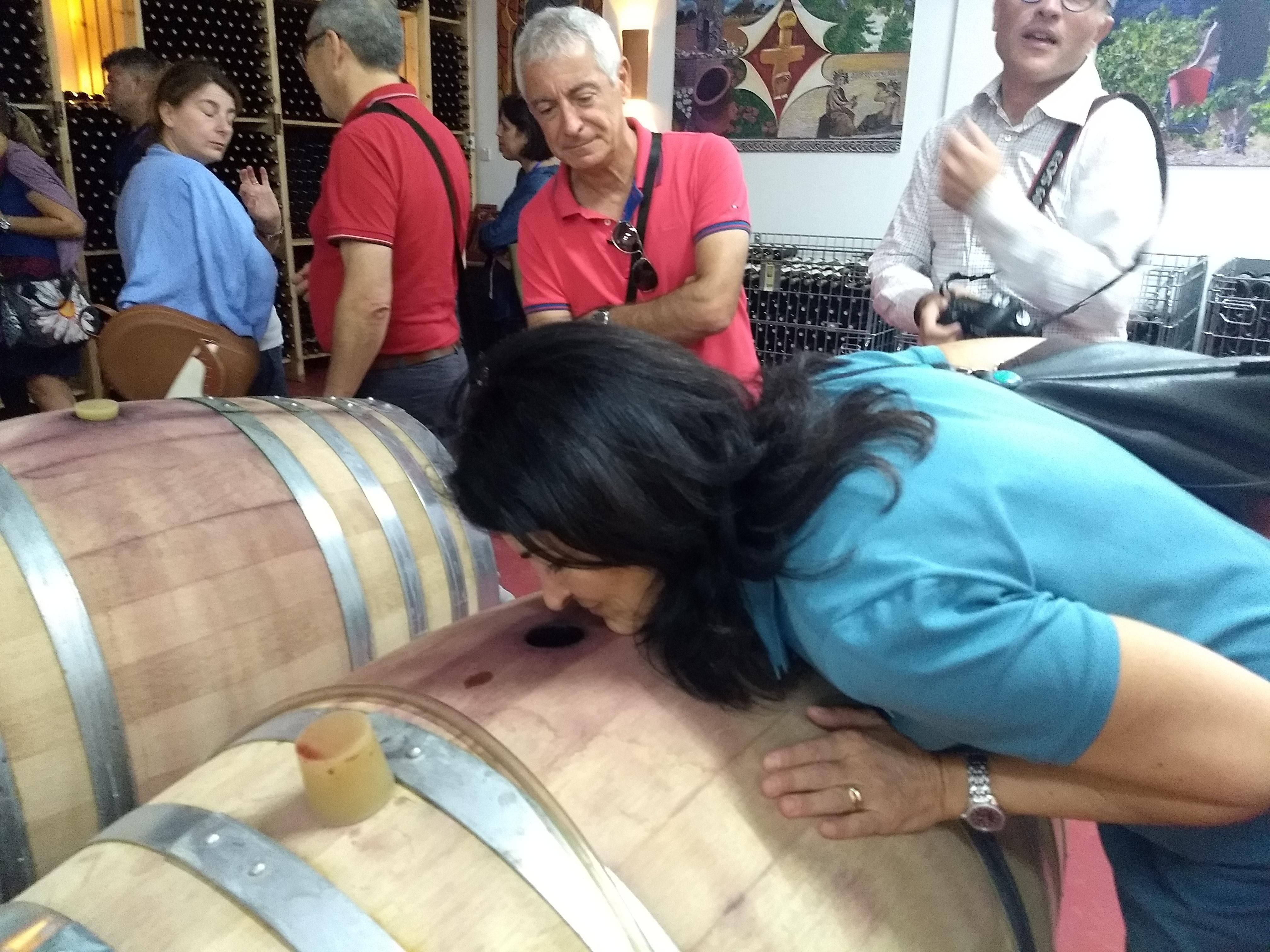
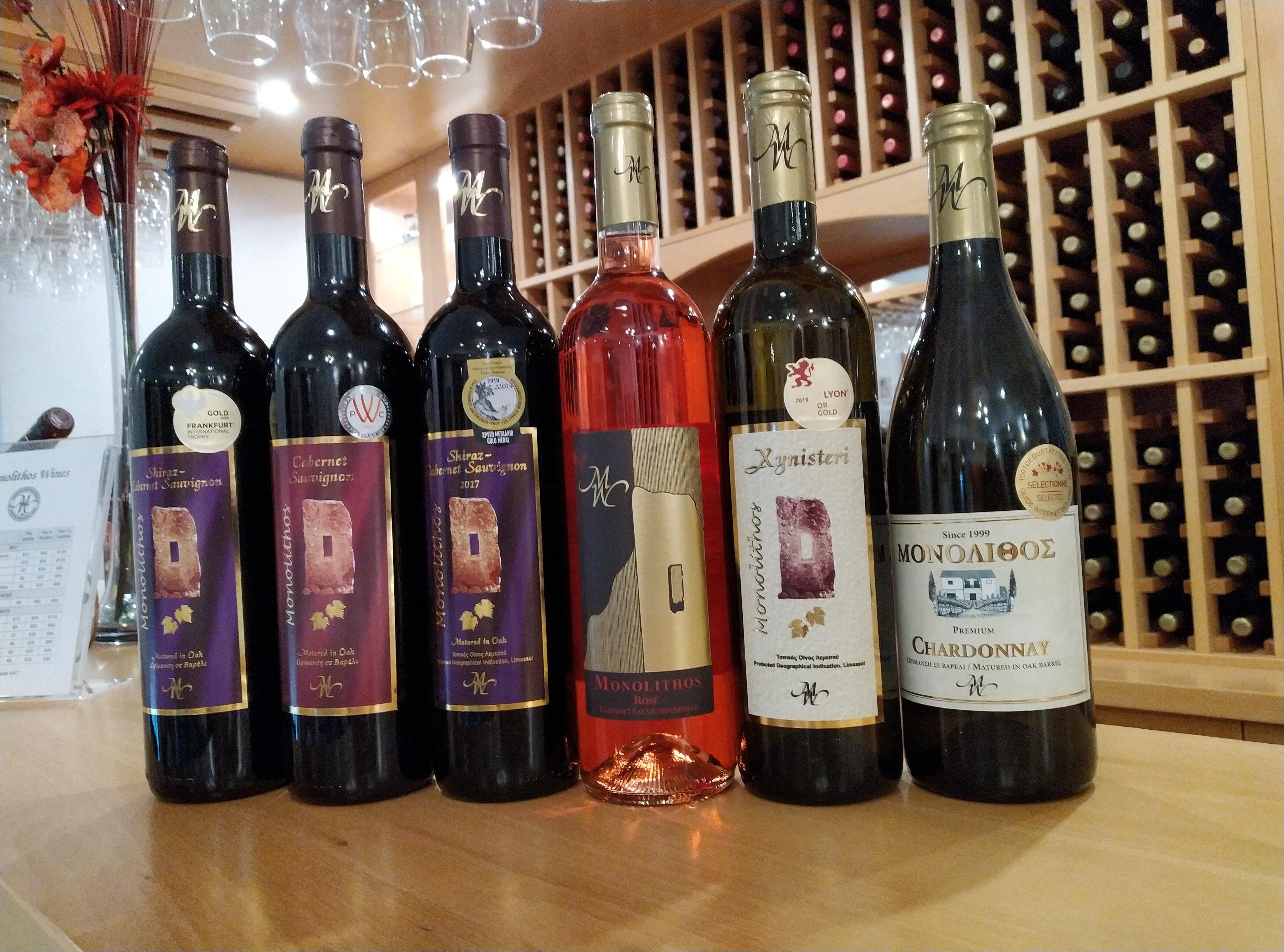
7 -Where in Cyprus, besides your winery, we can taste your wines?
Monolithos wines are distributed to a number of select hotels, restaurants and wine shops. Typically, in the:
Protaras area: Hotels and restaurants in the Sunrise Beach Hotel group
Nicosia: Cava Perianos, Fiesta del Vino and Kyriakides Brothers
Limassol: Viva Cava
8 - Please list your awards. What is the most significant award for you?
Our wines have been created in three styles with the aim of satisfying specific consumer segments, from the everyday drinking (value for money, wines) to the more classic style
and finally, for the wine aficionados or connoisseurs, we offer the more complex premium wines. You may cherish all, but each has its occasion.
We are proud to confirm that all Monolithos Premium wines have been awarded medals in international competitions. Of course, we are thrilled with the results because these awards are reminders of the skill, precision and commitment it takes to win a medal, sometimes competing against the best in the world.
Medals were awarded to the following wines:
Monolithos Premium Xynisteri (100%) 2018 (Gold Medal: Lyon, France)
Monolithos Premium Chardonnay (100%) 2018 (Star Wine: Paris, France)
Monolithos Shiraz/Cabernet Sauvignon 2017 (Gold Medal, Cyprus)
Monolithos Shiraz/Cabernet Sauvignon 2018 (Gold Medal, Frankfurt)
Monolithos Premium Cabernet Sauvignon (100%) 2018 (Silver Medal, Paris)
Winning medals from prestigious and respected wine competitions is a great hon our, particularly for small wineries, as any medal means good publicity and constitutes a reassurance that the awarded wine is the best of its kind.
9- If it's not a secret, share your plans for the future
The wine business is a difficult one. We are totally self-financed, having turned down any offers of assistance or investment. We like our independence, and ultimately, we want to answer only to our selves and the standards we set for our wines. However, the wine industry is dynamic and in order to be successful, one must continually and rapidly adjust to changing circumstances. Since our relocation to the new winery (2016) we have been focusing on the production of relatively small quantities of quality wines. The success of our wines in international competitions will inevitably have an impact both on our company and the consumer. For us, a medal means good publicity. It also constitutes a reassurance that the awarded wine is a great example of our capabilities. We hope that the local consumer will see these results as a solid recommendation for Cypriot exceptional award-winning wines and wine lovers will be encouraged to try and enjoy them. Marketing will play a significant role on this objective. We are also pleased to say that we are currently receiving attractive inquiries from countries in Europe and China. In the coming years, we intend to enrich our range of wines by exploring local indigenous varieties. These days, over 95% of all wines made in Cyprus are consumed on the island by tourists and Cypriots. Monolithos Winery so far has produced wines from mostly international varieties which were cultivated and successfully adapted to the local terroir of Pachna. However, indigenous grape movements have affected every wine-growing country in Europe, bringing about a diversity of varieties and styles previously unknown to the modern wine drinker. Cyprus is one such place, with more than 10 indigenous grape varieties that grow well in a hot climate without irrigation. Consumer studies have demonstrated that wines made from these Cypriot varieties are equally, if not more, acceptable than wines made from more traditional European grapes. Another area we currently investing resources is oeno-tourism or wine tourism. Though it is still a niche within the larger Cyprus tourism industry, its growth has become a force that can no longer be ignored. Our wine-making philosophy is based on close relationships with the local land and tradition, rather than an easy means to a fast profit. Monolithos Winery provides visitors with a complete insight and experience of wine culture. Visitors are able to discover where local history meets modern wine-making and the magic of the complete wine-making process of our distinguished wines that will enhance their wine experience.
10 - Since the "Yellow Road" is a project that, according to the author's idea, is capable of uniting all types of art. And first of all, the art of winemaking with traditional views: music, sculpture, painting, literature ... Maybe if the stars "coincide", a sculpture "Malevich. Victory over the Sun" will appear on one of your terraces?
I am glad you brought art into your questions. Here at Monolithos, we associate wine with lifestyle, friendship, place, art, technology and nature. We believe that wine and culture grow side-by-side, becoming timeless treasures which leave their indelible stamp on history. Our aim is not simply to focus on the product, but beyond this to underline the important social and cultural issues involved in the production, consumption and delight of wine.
In fact, in our exhibition room, the visitor has the opportunity to see old maps, posters, engravings, photographs, vine and wine-making tools and family ornaments. We also provide audio visual projections related to Cyprus history and wine.
11 - What is your choice (your white wine) for "Yellow Road"?
I strongly recommend Monolithos Premium Xynisteri (Gold Medal, Lyon France). Nearly every winery in Cyprus is producing a dry white wine from Xynisteri. At Monolithos Winery, the Xynisteri grapes are treated in particular ways; techniques such as pre-fermentation cold soaking, controlled fermentation together with extended lees ageing, and some oak maturation are all techniques used to boost its age ability and complexity. Crisp and aromatic, with lots of citrus and flavours, Monolithos Xynisteri is unexpectedly food-friendly, excelling beside white fish such as nice “tsipoura” (sea bream) or “lavraki” (sea bass)in the oven with grilled vegetables, grilled trout, fish and chips, shrimp salad, roast chicken with potatoes or rice pilaf, veggie and vegetarian recipes, salads that contain goat’s cheese or fetta, and moderately spicy dishes. It is best served at temperatures of 8º-10ºC,
12 - What white wine producer (from Cyprus or another country) would yourecommend for Yellow Road?
Zambartas Winery39, Grigores Afxentiou Street4710 Agios Amvrosios Limassol
Sergey Evtuhov,
author of the "Yellow Road" project
